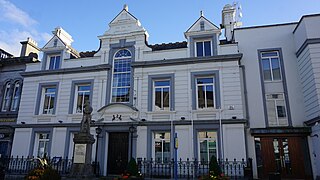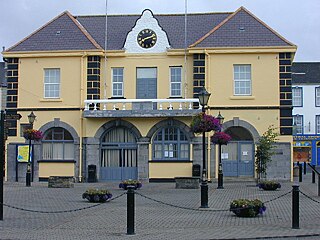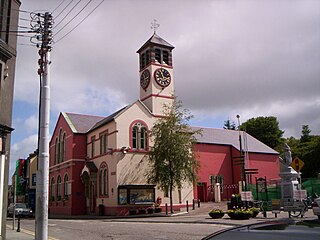
Tuam is a town in Ireland and the second-largest settlement in County Galway. It is west of the midlands of Ireland, about 35 km (22 mi) north of Galway city. Humans have lived in the area since the Bronze Age while the historic period dates from the sixth century. The town became increasingly important in the 11th and 12th centuries in political and religious aspects of Ireland. The market-based layout of the town and square indicates the importance of commerce.

Richard William Dowling was an Irish-born artillery officer of the Confederate States Army who achieved distinction as commander at the battle of Sabine Pass (1863), the most one-sided Confederate victory during the American Civil War. It is considered the "Thermopylae of the Confederacy" and prevented Texas from being conquered by the Union. For his actions, Dowling received the "thanks of Congress", Davis Guards Medal, Southern Cross of Honor, and Confederate Medal of Honor. Over a dozen other memorials have also been dedicated in his honor.
Events from the year 1654 in Ireland.

Mountbellew or Mountbellew Bridge is a town in County Galway, Ireland. It lies mostly within the townland of Treanrevagh on the N63 national primary road. As of the 2022 census, it had a population of 774.

The R332 road is a regional road in County Galway and County Mayo in Ireland. It connects the N63 road at Horseleap Cross near Moylough in County Galway, via Tuam, to the N84 road at Kilmaine in County Mayo, 38 kilometres (24 mi) away.

Ballyclare Town Hall is a municipal structure in The Square, Ballyclare, County Antrim, Northern Ireland. The structure, which is primarily used as an events venue, is a Grade B2 listed building.

Garstang Town Hall is a municipal building in the High Street in Garstang, Lancashire, England. The structure, which currently accommodates two shops and a Royal British Legion Club, is a Grade II listed building.

Helmsley Town Hall is a municipal building in the Market Place in Helmsley, North Yorkshire, England. The structure, which is used as a community library and a community events centre, is a grade II listed building.

Bampton Town Hall is a municipal building in the Market Square in Bampton, Oxfordshire, England. The building, which is primarily used as an arts centre, is a Grade II listed building.

Fenton Town Hall is a municipal building in Albert Square in Fenton, Staffordshire, England. It is now occupied by local businesses, a café and an art gallery.

The Tholsel is a municipal building in West Street, Drogheda, County Louth, Ireland. Formerly the meeting place of Drogheda Borough Council, it is currently used as a tourist information office.

Clonmel Town Hall is a municipal building in Parnell Street, Clonmel, County Tipperary, Ireland. The building accommodated the offices of Clonmel Borough Council until 2014.

The Arch Building, previously known as Cobh Town Hall and before that as Queenstown Town Hall, is a municipal building in Casement Square, Cobh, County Cork, Ireland. The building currently accommodates a public library and a tourist information centre. It is included in Cork County Council's Record of Protected Structures.

Wicklow Town Hall, is a municipal building in the Market Square, Wicklow, County Wicklow, Ireland. The building currently accommodates the local offices of Wicklow County Council and the offices of Wicklow County Tourism.

New Ross Town Hall, formerly known as The Tholsel, is a municipal building in Quay Street, New Ross, County Wexford, Ireland. The building, which was used as the local market house through much of its life, is now used as a civic building.

Kilrush Town Hall is a municipal building in the Market Square, Kilrush, County Clare, Ireland. The building is currently used as by Clare County Council as offices for the delivery of local services.

Skibbereen Town Hall is a municipal building in The Square at Skibbereen, County Cork, Ireland. It is currently used as a community events venue, hosting concerts and theatre performances.

Bakewell Town Hall is a municipal building in Anchor Street in Bakewell, a town in Derbyshire in England. The building, which serves a community events venue, is also the home of Bakewell Town Council.

Bandon Town Hall is a municipal building on North Main Street in Bandon, County Cork, Ireland. It is currently used as a community events venue.



















